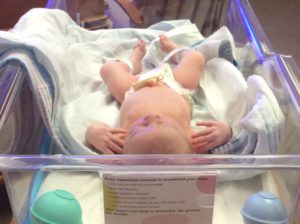Can you believe it’s already AUGUST! Oy…it was JUST June! Well, here are a few of our favorite things we will be enjoying this month (and you can too)!!!
- Beach vacations,
- Ice cream on hot summer nights,
- Back to school shopping,
- Outdoor concerts, &
- National Breastfeeding Month (#NBM18)!

According to the CDC, “Breastfeeding is the best source of nutrition for most infants. It can also reduce the risk for some short- and long-term health conditions for both infants and mothers.” How wonderful! As you continue on your pregnancy journey, the beginning of the third trimester of pregnancy is the perfect time to prepare for breastfeeding. We are grateful to have Dr. Bess Milliron, the Medical Director for the Breastfeeding Center of Charleston, to share informative tips on how to best prepare for successful breastfeeding.
8 Ways to Prepare for Successful Breastfeeding
- Look for Breastfeeding Classes in your community.These are usually offered at hospitals or independent breastfeeding centers. Sign up early and bring a support person if possible.
- Find breastfeeding support groups near you:
- Check out a La Leche League meeting.
- Contact the hospital where you are to deliver.
- Contact local Breastfeeding Centers in the area to see what groups they offer.
- Know what help is available to you in the community if you run into problems. Look into Internationally Certified Breast Feeding Consultants (IBCLC) in the area or Breastfeeding Centers which employ them so that if you run into a problem you know where to go. See if they offer any lactation telephone triage for problems you may run into when you are not available to immediately come in.
- Obtain a breast pump. Talk to your insurance company about your pump – order pump if this is an option to do prior to delivery. If your insurance company does not send the pump until baby is born find out the process that needs to be set in place so you may get it ASAP when you deliver. Ideally you want to have a double electric breast pump. A hand pump is another great option to have along with the double electric for times that you may be traveling or to keep easily accessible. Before the baby comes take apart the breast pump and familiarize yourself with how it works, how to clean it, what size flanges it comes with, and do an initial round of sterilization prior to use.
- Plan a meet and greet with your pediatrician. Make sure they are supportive of breastfeeding and see what parameters they have in place for helping you be successful.
- Schedule a prenatal breastfeeding consult with an IBCLC. This is especially helpful if you have any risk factors for low supply (previous history of low supply, PCOS, hypothyroidism, diabetes, history of breast surgery, expected premature delivery, etc). They can also evaluate you for potential breastfeeding roadblocks such as inverted nipples, flat nipples, hypoplastic breast tissue, etc. Bring your pump to this visit so that the IBCLC can ensure that you are using the correct size flange and that the pump is working well.
- Stock up on books. We recommend “The Womanly Art of Breastfeeding.”
- Gather breastfeeding supplies.Some essentials are supportive nursing bras without underwire, coconut oil or nipple butter, clothes with easy access for nursing, breast pads, and a supportive breastfeeding pillow.
Next time on our blog post “Breastfeeding Prep Part 2,” we will provide Dr. Milliron’s Top 10 Breastfeeding Supplies…stay tuned!

Dr. Bess Milliron MD, FAAP, IBCLC, is Board Certified in Pediatrics, a Fellow of The American Academy of Pediatrics, an International Board Certified Lactation Consultant (IBCLC) and is the Medical Director for the Breastfeeding Center of Charleston.
The Breastfeeding Center of Charleston “believes the health of the mother and her newborn are intricately intertwined. For this reason, we will be providing comprehensive, coordinated care to the mother and baby as a unit at the Breastfeeding Center of Charleston. Comprehensive care includes exams for the both the mother and baby to ensure optimal health for the breastfeeding duo. Our team will work closely with the mother’s OBGYN and the baby’s primary pediatrician to provide continuity of care for the breastfeeding duo. We will communicate the plan of care that is rendered at each visit back to the primary providers.”
For more information on breastfeeding, contact your local hospital, breastfeeding center or the Breastfeeding Center of Charleston today.